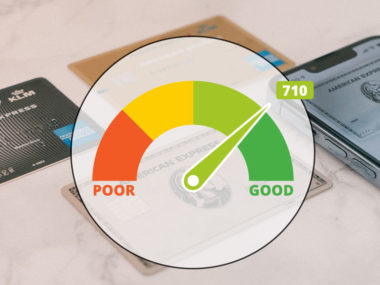It’s wise to check your credit score from time to time. This number shows you the current state of your credit and indicates how potential lenders will view your financial stability (or lack thereof).
If you have a credit score of 672, you have a “good” score according to the FICO credit score model. This is split into five categories:
- Poor: 300 to 579.
- Fair: 580 to 669.
- Good: 670 to 739.
- Very Good: 740 to 799.
- Exceptional: 800 to 850.
While 672 is classed as a good score, it is on the lower end of the range. Though there is room for improvement, don’t panic. You’re in a great position to begin boosting your credit.
You can start this process by finding out what is currently making your score hover in the mediocre range. Once you understand what financial activities are helping and which ones are hurting, you can begin to tailor your behavior in the name of working toward a better credit score.
Table of Contents
Why Your Credit Score Is 672
There are many reasons to have a credit score of 672. When your score is in a middle ground like this, it typically implies that there are both strengths and weaknesses inherently involved in your financial activity.
None of these factors will be the same from one person to the next. However, several common contributors can lead to a score of this nature.
Your Credit Utilization Ratio and Your Total Debt
The amount of your credit you’re using can influence your score in both good and bad ways. This is summed up in the term credit utilization ratio. In essence, this is the amount of your available credit that you’re currently using. If this ratio continually rises above 30%, it can hurt your overall credit score.
The total amount of your debt is a major contributor to your credit score, as well. The FICO model calculates 30% of your total score based on how much money you owe to creditors, as well as your total debt.
By reducing your debt, increasing your available credit, or both, you can help boost your score.
Your Payment History
Your payment history is the most important factor for calculating your credit score. The ability to make payments consistently, on time, and in full is an essential part of a good credit score.
If you find that you miss payments, even occasionally, it may be holding you back from a higher credit score. That said, if you make your payments on time, it may be one of the primary factors that are helping you maintain a good score in the first place.
The Average Age of Your Credit
The older your credit track record, the better your score will be. This is simply because the more history a lender can see, the more they can trust your financial activity.
This can mean a young person with a limited credit history may not be able to get above a decent credit score even if they do everything correctly. In addition, if someone opens several new lines of credit all at once, it can reduce the average age of their credit, bringing their score down in the process.
Derogatory Marks on Your Credit Report
Even if you’re doing everything else very well, if you have a derogatory mark or multiple marks on your credit report, it can hold you back from a very good or excellent credit score.
On top of that, derogatory marks can remain on your report for years at a time. This can come from negative financial events such as defaulting on a loan, repossessions, foreclosures, or a claim by a collection agency.
When this happens, you must resolve the existing issue. Then you can attempt to have a mistaken mark removed by disputing it. If the mark is legitimate and correct, you can still send a forgiveness letter to the lender asking them to forgive the mistake.
Hard Inquiries
Another simple way that your credit score can be affected is with hard inquiries. This happens when a lender checks your credit before giving you a loan.
If you have too many of these close to one another, they can significantly drag down your score. If that’s the case, don’t worry. They only last for up to a year before they’re expunged from your record.
Different Kinds of Credit
Finally, if you have a variety of different credit lines, it can boost your credit score. On the other hand, if your only form of credit is a credit card or an auto loan, it can negatively impact your score.
When this is the case, diversifying your credit (e.g. getting a mortgage, auto loan, credit card, personal loan, and so on) can help to improve your score.
What Can You Do With a 672 Credit Score?
If you have a good credit score, many credit-related activities open up to you. However, you still won’t be able to participate in many of the extra perks that are provided for those with very good and excellent scores. Nevertheless, you can still:
- Apply for a mortgage: While you can be approved for a mortgage with a 672 credit score, don’t be surprised if the interest rate is higher than you’d like.
- Get an auto loan: Once again, while you can technically get a loan, the amount of interest you pay will likely be higher until you boost your score.
- Sign up for credit cards: With a good credit score, you can apply for many of the major credit cards. However, you probably won’t qualify for a lot of the benefits and rewards that they often offer.
- Get an apartment: Many landlords conduct a credit check for a new tenant. If you have good credit — especially due to on-time payments — you’re more likely to be approved.
While there are limitations, a 672 credit score does open up the doors to many different borrowing activities.
How to Improve a 672 Credit Score
If you have a 672 credit score, you don’t have anything to worry about. The lending world sees you as a modestly responsible borrower, which is a great starting point. However, it’s always good to be looking for ways to increase your financial health. You can do this by:
- Always making payments on time.
- Using credit regularly by borrowing and paying back money correctly.
- Paying down as much of your existing debt as possible.
- Reviewing your credit report every year to see if you need to dispute any errors.
As you work to improve your credit score, remember that you’re already doing well. At this point, the goal isn’t to fix or repair your credit, but rather to take it from good to great.
Image Source: https://depositphotos.com/





